
The Ultimate Guide to Buying Cemetery Lowering Devices
The Professional's Guide to Cemetery Lowering Devices
Cemetery lowering devices are mechanical frames designed to safely lower caskets into graves during burial ceremonies. For funeral directors seeking reliable equipment, here's what you need to know:
- Purpose: Provides controlled, dignified descent of caskets into graves
- Types: Standard models (Master, Imperial, Superior), specialized (infant/urn devices)
- Capacity: Most handle 800-1,000 lbs
- Key Features: Centrifugal braking systems, sealed bearings, adjustable frames
- Price Range: $4,000-$12,000 depending on model and accessories
Cemetery lowering devices represent one of the most visible pieces of equipment during the burial ceremony. Their smooth operation creates a dignified final moment for families while ensuring staff safety.
The modern lowering device uses precision gearing and braking systems to maintain consistent descent speed regardless of casket weight, eliminating uneven manual lowering methods.
"Using a casket lowering device increases the prestige of the funeral home and maximizes the psychological comfort of the deceased's loved ones," notes one industry expert.
For funeral directors, selecting the right device means balancing durability, ease of use, and maintenance requirements against budget constraints.
I'm Mortuary Cooler, a national supplier of mortuary equipment with extensive experience helping funeral professionals select cemetery lowering devices that meet their specific operational needs.
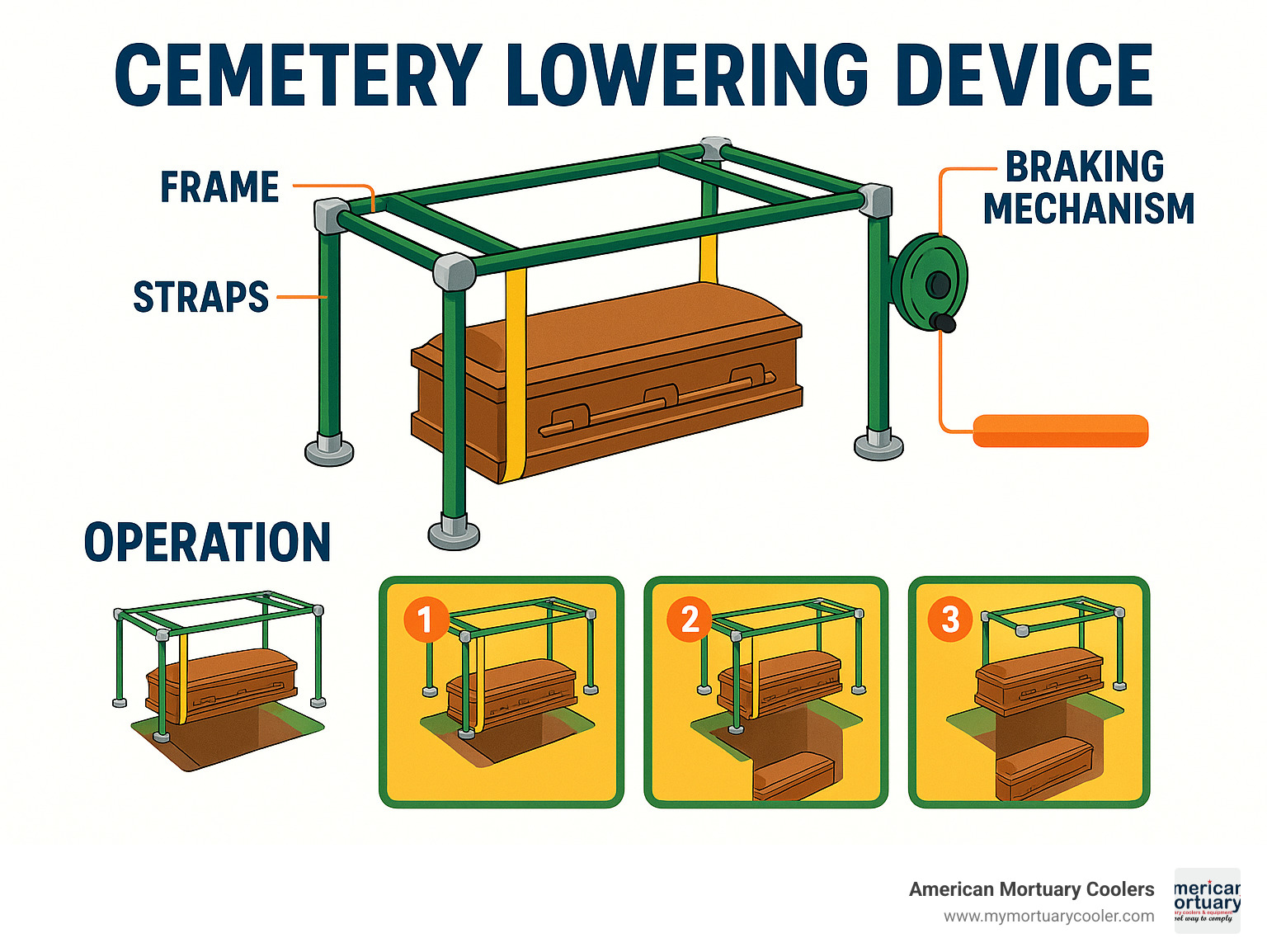
Quick look at cemetery lowering devices:
What Is a Cemetery Lowering Device & How Does It Work?
A cemetery lowering device is a specialized mechanical frame designed to gently lower a casket into its final resting place with precision and respect. It features a rectangular metal frame with adjustable rails that telescope to fit different grave sizes, with straps that cradle the casket and a braking system that controls the descent.
Using one is straightforward: funeral staff position the device over the open grave, place the casket on the supporting straps, and release the hand brake to begin a controlled lowering. These devices maintain a steady descent regardless of casket weight.
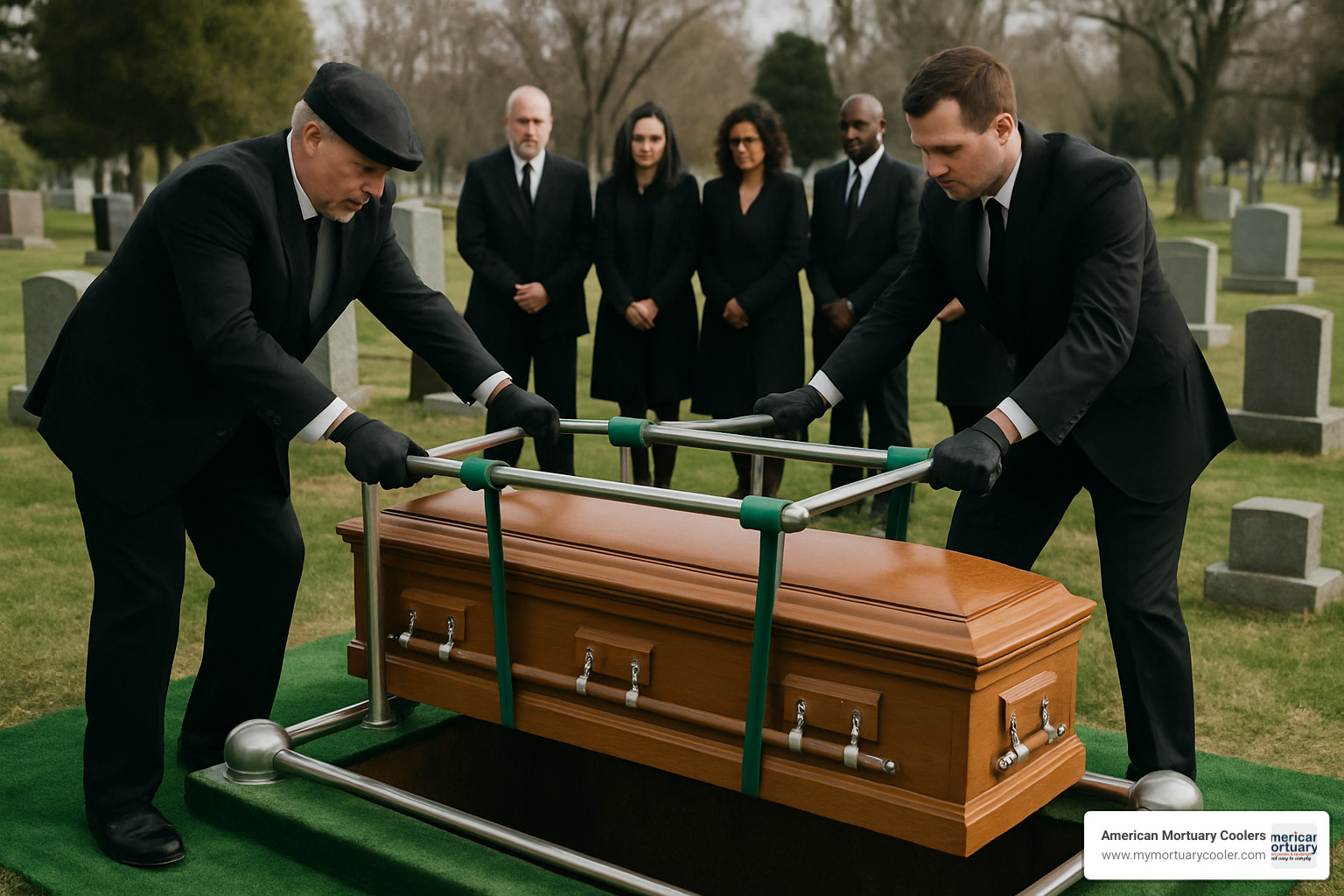
The Science Behind Controlled Descent
The smooth, unhurried descent is achieved through thoughtful engineering. Most professional cemetery lowering devices use a centrifugal gear system that automatically adjusts to the weight being lowered, ensuring both lightweight urns and substantial caskets descend at the same dignified pace.
Key components include:
- Centrifugal gears that naturally increase resistance as weight increases
- Sealed, self-lubricating bearings that ensure smooth operation with minimal maintenance
- Positive-lock braking systems for immediate control when needed
- Tempered steel and bronze precision gearing for durability in all weather conditions
The popular Frigid Master Lowering Device's handcrafted governor ensures the same gentle lowering speed regardless of casket weight, explaining why quality devices often remain in service for decades.
Cemetery Lowering Devices in Action
During a burial service, a small team (usually two people) operates the device with practiced precision. They position the frame over the grave, ensuring it's level and secure.
When pallbearers arrive with the casket, they place it onto the device's straps, which are pulled taut across the frame. At the appropriate moment in the service, workers remove any supporting blocks, transferring the casket's weight fully to the straps.
One worker then releases the hand brake, activating the controlled descent mechanism. The rotating poles gradually extend the straps, and the casket descends smoothly until it reaches the bottom of the grave. Workers then withdraw the straps and remove the framework.
This process typically takes about a minute – a brief but pivotal moment that provides a dignified conclusion to the graveside service.
Want to see exactly how this works? You can watch how a casket is lowered to get a clear visual of these remarkable devices in action.
Choosing the Best Cemetery Lowering Devices: Key Specs & Features
When selecting a cemetery lowering device for your funeral home, consider these key factors:
- Load capacity: Most quality devices offer 800-1,000 pounds capacity
- Telescoping dimensions: Look for adjustability from around 62" x 26" when closed to approximately 94" x 38" when extended
- Construction material: Stainless steel offers excellent corrosion resistance for humid regions
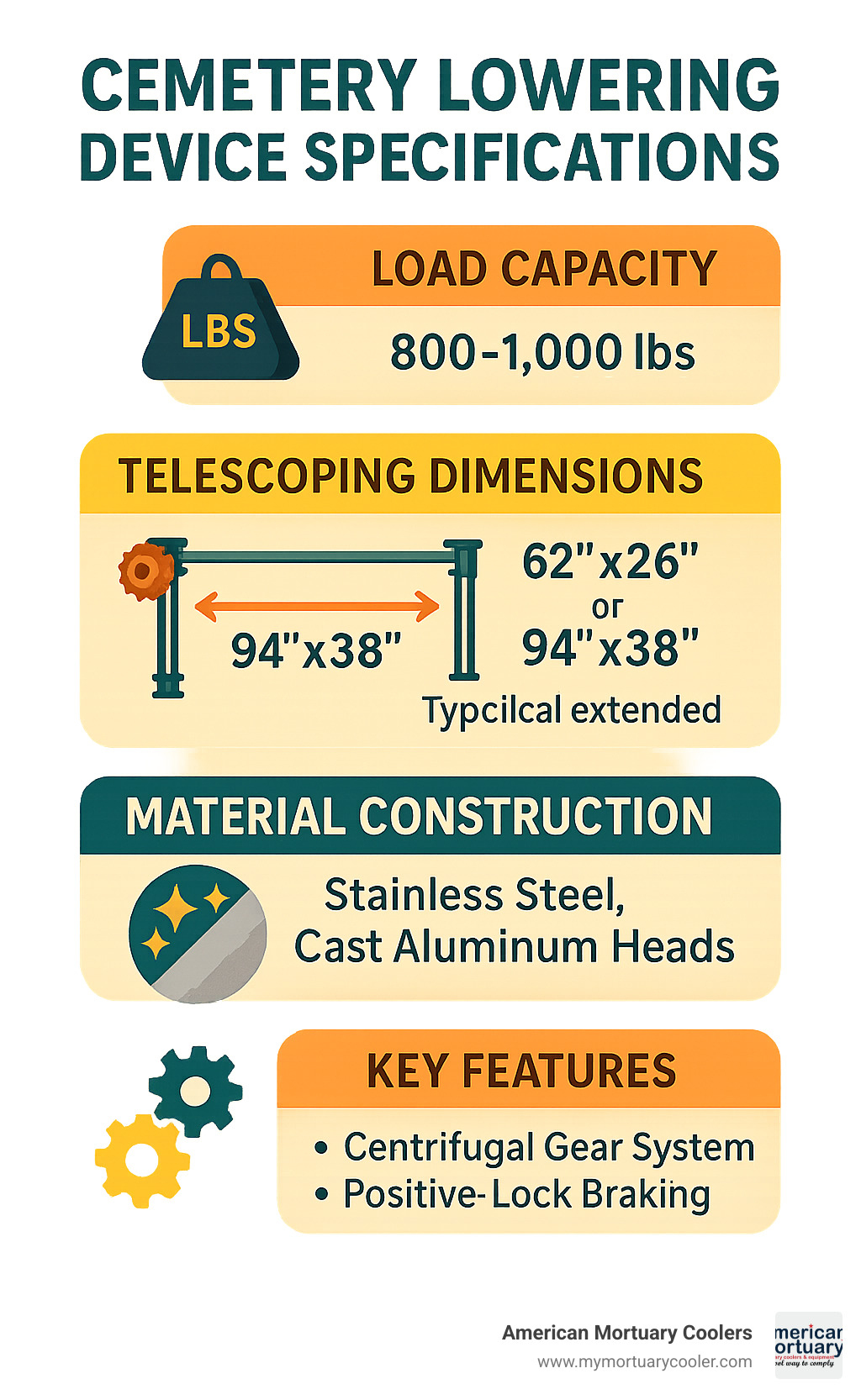
Cemetery Lowering Devices – Core Specifications to Compare
When comparing models, focus on these essential specifications:
- The Frigid Master Lowering Device offers a 1,000-pound rating, ideal for oversized caskets
- The Frigid Imperial and Junkin Superior models support up to 800 pounds
- Strap width is crucial – industry-standard straps measure about 3 ⅞" wide with a break weight of 2,000 pounds
- Device weight matters for staff handling – the Revolution Lowering Device weighs approximately 90 pounds, while the Frigid Master is around 125-130 pounds
The best devices feature sealed, self-lubricating bearings and tempered steel and bronze gearing that minimize maintenance while maximizing longevity. ISO:9001 certified stainless-steel rails provide superior durability.
Cemetery Lowering Devices for Urns & Infant Caskets
Specialized cemetery lowering devices for urns and infant caskets maintain professional appearance while being appropriately scaled down. The Frigid Infant/Urn Lowering Device supports up to 362 kg (approximately 800 pounds) – providing complete peace of mind during these sensitive services.
These specialized devices feature frame dimensions sized for smaller caskets and urns, easy-release hand brakes for single-operator use, and included stands for presentation. The simplified setup ensures staff can focus on supporting grieving families rather than wrestling with equipment.
Offering consistency across all types of services demonstrates your funeral home's commitment to honoring every life with equal dignity and care.
Main Types, Models & Accessories on Today's Market
The world of cemetery lowering devices offers several trusted models that funeral professionals rely on daily.
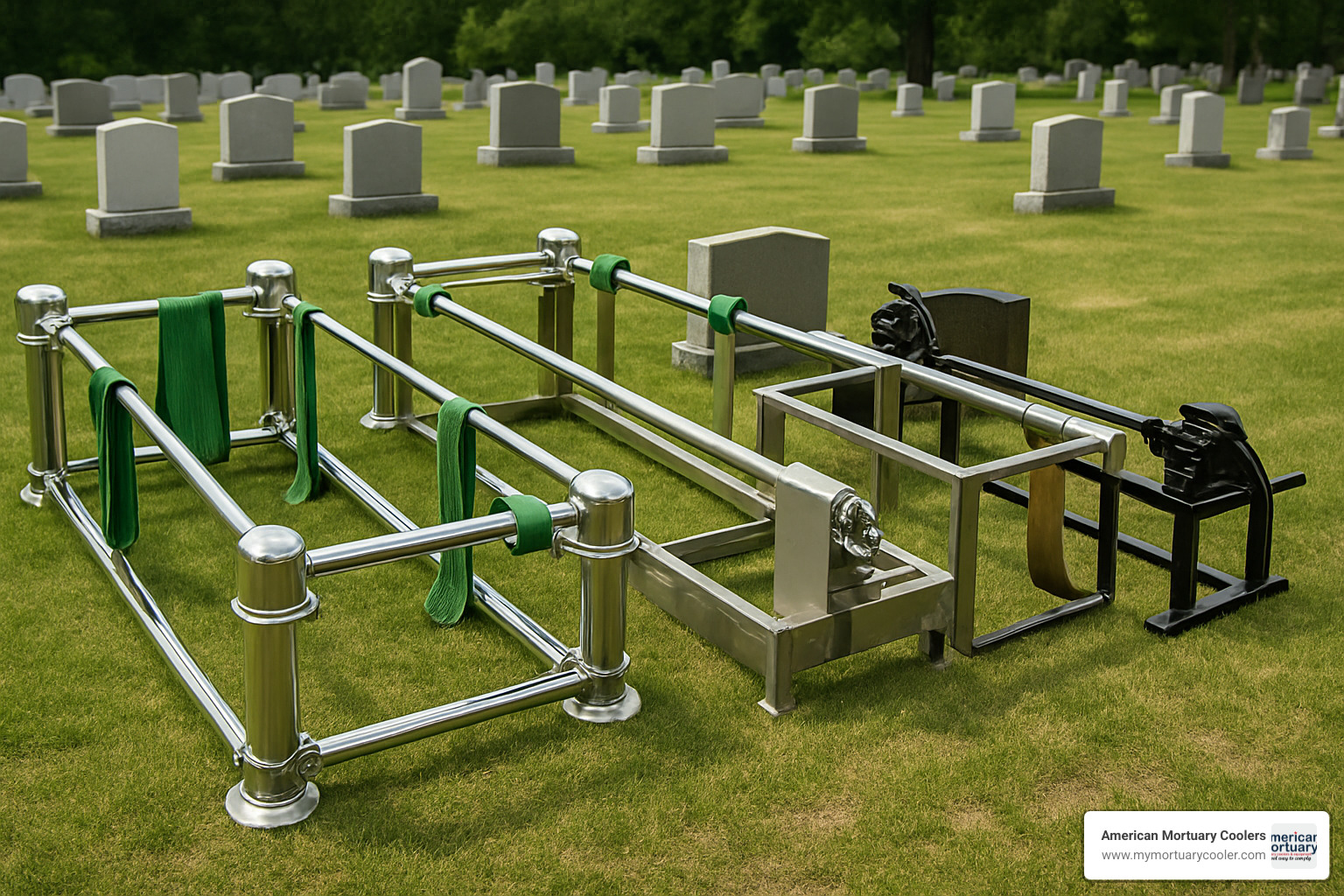
The most reliable options include:
- Frigid Master: Industry workhorse with 1,000-lb capacity
- Frigid Imperial: Lighter alternative with 800-lb capacity
- Junkin Superior: Each strap individually tested to 400 lbs (800 lbs total)
- Revolution: Weighs just 90 pounds while handling caskets up to 900 pounds
- Streamliner: Combines a mobile cart with a lowering device
Heavy-Duty & Oversize Units
For funeral homes regularly serving families with oversized caskets, the Master HD model offers a robust 1,000-lb capacity with reinforced framing for extra stability on uneven cemetery grounds. Optional check bars prevent shifting on slopes.
The placer arms feature allows precise alignment without awkward adjustments in front of grieving families. While heavy-duty units weigh more (about 170 lbs with placers attached), the extra weight provides best stability.
Mobile & Platform Solutions
The Frigid Streamliner Mobile Set-up Combo (starting at $11,585.61) combines transport and lowering functions in one system. Its removable towbar allows you to attach skirting for a clean presentation at graveside, while the lightweight polyethylene construction enables one-person maneuvering across most cemetery terrain.
Another innovation is the SG Burial Platform. These sturdy polyethylene platforms feature non-skid surfaces, waterproof lids, and tapered edges that reduce tripping hazards for mourners.
Must-Have Accessories & Add-Ons
Essential accessories that improve both operation and presentation include:
- Adjustable stands for adapting to different grave depths
- Professional drapes that transform the mechanical device into something dignified
- Safety chains and straps for peace of mind during casket positioning
- Placer arms for precise casket positioning
- Green grass artificial turf for a finished look
For more information on essential funeral equipment, see our guide to Essential Mortuary Equipment.
Safety, Maintenance & Efficiency Compared to Manual Methods
Modern cemetery lowering devices have revolutionized the burial process, offering significant improvements over traditional manual methods.
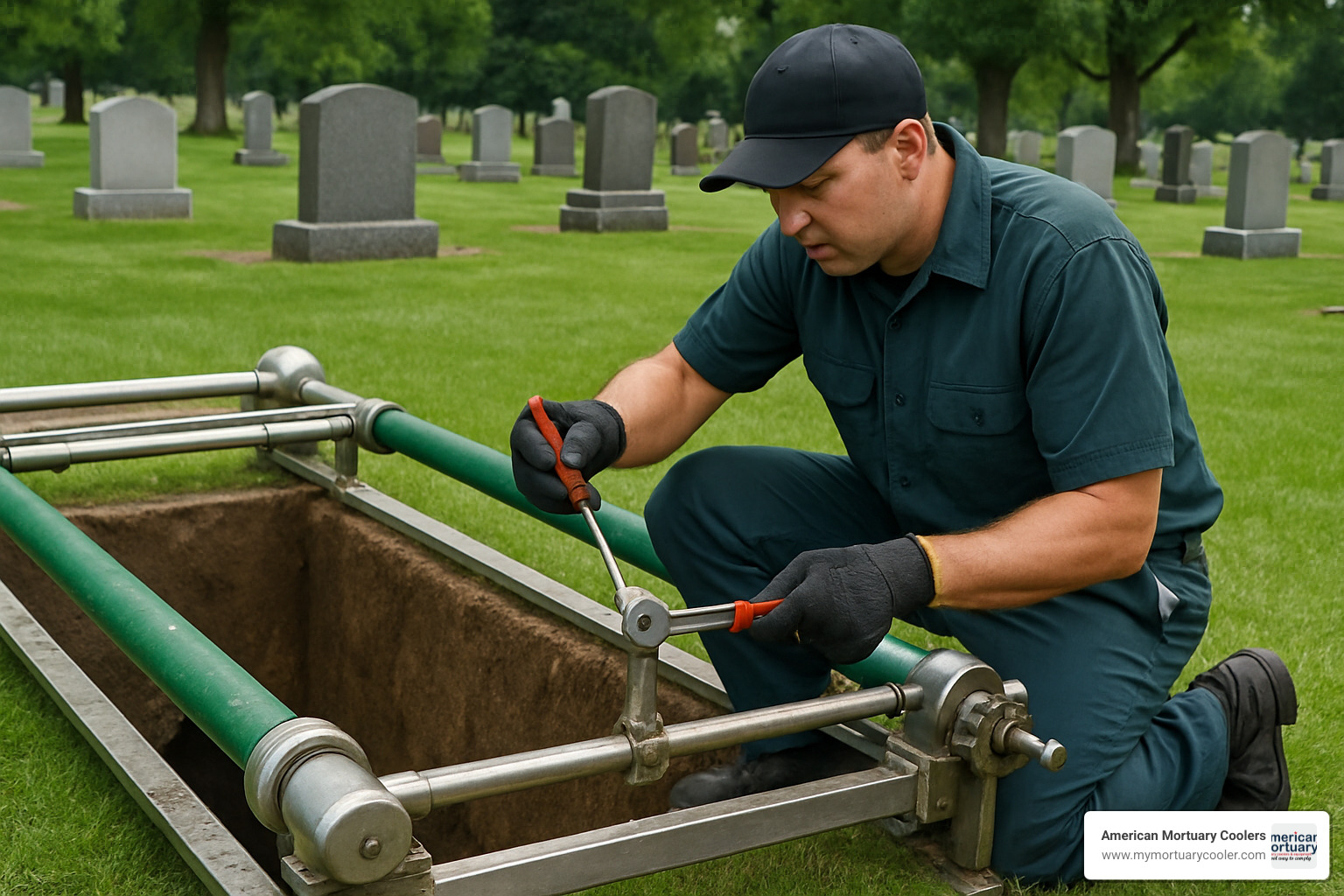
These mechanical devices provide:
- Improved operator ergonomics - reducing physical strain on staff
- Consistent lowering speed - maintaining dignity regardless of casket weight
- Professional appearance - creating a polished impression for families
- All-weather reliability - functioning in rain, heat, or cold conditions
Many modern devices feature lifetime lubrication systems, minimizing maintenance while ensuring smooth operation for years.
Maintenance Checklist for Longevity
A quality cemetery lowering device can serve for decades with proper care:
- After each use, remove dirt, grass, and debris from moving parts
- Before each service, examine straps for signs of wear, fraying, or damage
- Apply recommended lubricant to moving parts twice yearly
- Store in a clean, dry environment when not in use
- Consider annual professional inspection by specialists like GARCIA'S LOWERING DEVICE SERVICE
With this straightforward maintenance routine, your investment will continue performing flawlessly when families need it most.
Manual Ropes vs Modern Devices
The difference between traditional rope lowering and modern devices is substantial:
Manual Rope Methods:
- Require 4-6 people working in perfect coordination
- Risk uneven lowering even with experienced staff
- Become dangerous in rainy conditions
- Place significant physical strain on workers
Modern Devices:
- Need just 1-2 operators
- Virtually eliminate uneven lowering
- Work consistently regardless of weather
- Present a professional appearance
- Address OSHA safety concerns
For busy cemeteries, the time savings alone justifies the investment. Setup and operation of a modern device typically requires just two workers and provides consistent results in about one minute per lowering.
While some green burial facilities intentionally use hand-held ropes to allow family participation, most conventional cemeteries have adopted mechanical devices for their reliability, safety, and professional appearance.
Emerging Innovations & Related Cemetery Handling Tools
The funeral industry continues to evolve with innovations making cemetery operations more efficient and dignified.
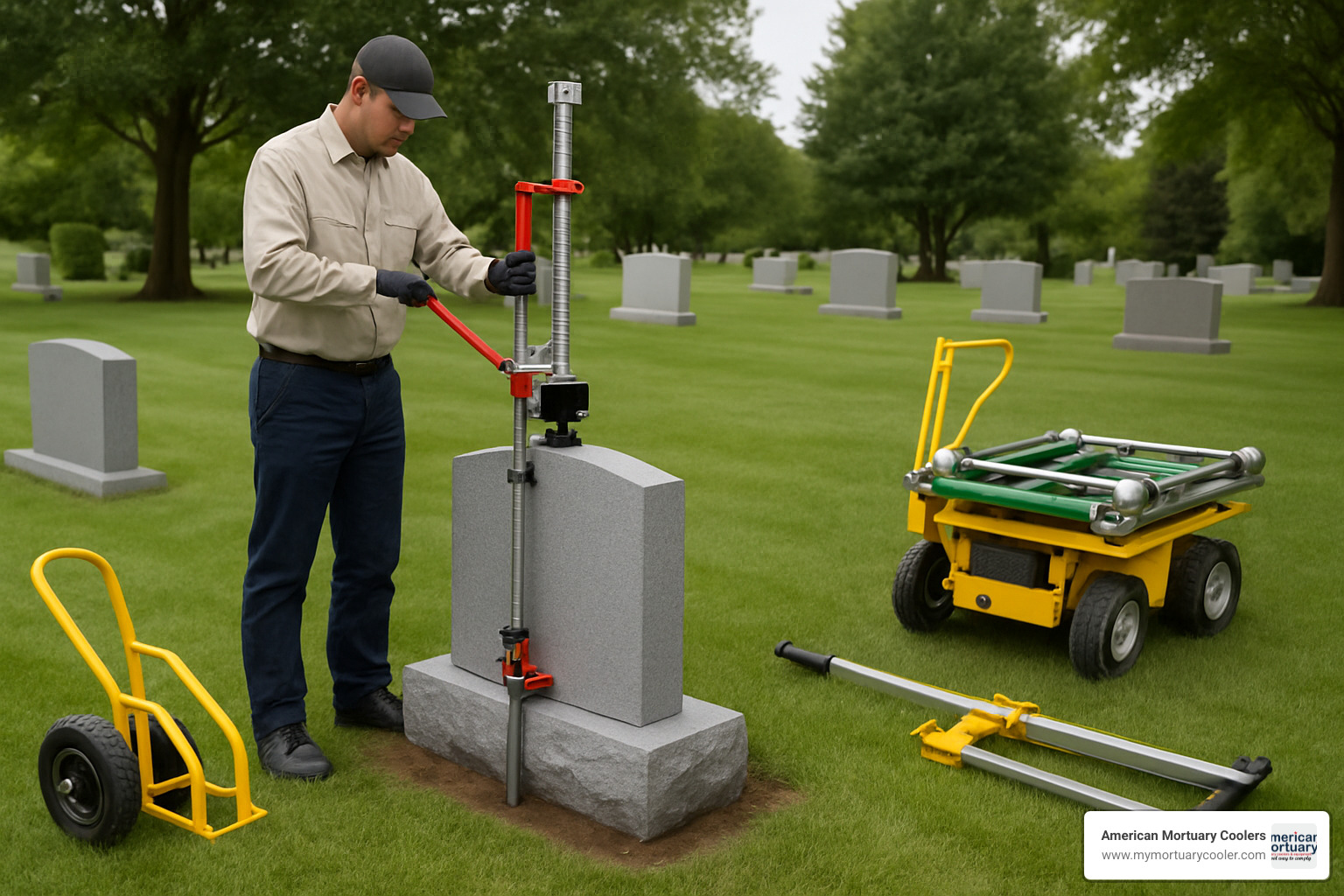
Recent advancements include:
- Polyethylene burial platforms replacing traditional "greens" with clean, stable surfaces
- Single-person tombstone jacks reducing manpower needed for monument placement
- All-in-One lifting systems combining multiple functions into single units
- Electric winches with wireless remote controls for safer loading/unloading
Monument & Tombstone Jacks: Different Tool, Same Goal
While focused on cemetery lowering devices, monument and tombstone jacks serve a similar purpose: providing mechanical advantage to safely handle heavy objects with minimal manpower.
The Tombstone Jack (model TJ4200) allows a single person to lift, level, and reposition monuments weighing several hundred pounds in about half an hour – a task that previously required multiple workers.
These jacks provide:
- Improved safety by eliminating manual lifting
- Precision for exact positioning
- Efficiency by reducing labor time
- Preservation of historical monuments
For more information about these helpful tools, see this Monument leveling guide.
Future Tech in Cemetery Lowering Equipment
While the core function of cemetery lowering devices remains the same, technology continues to evolve with:
- Smart-sensor speed control systems that monitor and adjust descent speed with greater precision
- Corrosion-proof composites combining metal-like strength with improved weather resistance
- Modular quick-lock rails that snap into place securely for faster setup
- Integrated stabilization systems that automatically compensate for uneven terrain
- Improved ergonomics reducing operator strain during setup and operation
These technologies improve the experience while maintaining the core purpose: providing families with a final moment of dignity and respect as they say goodbye to their loved ones.
Costs, Budgeting & Purchasing Tips
Investing in quality cemetery lowering devices represents a significant decision for any funeral home or cemetery. Understanding the price ranges helps put these costs into perspective:
- Standard lowering devices: $4,000-$8,000
- Heavy-duty models with placer arms: $8,000-$12,000
- Infant/urn lowering devices: $3,000-$6,000
- Mobile setup carts: $4,000-$5,000
- Complete device/cart combinations: $11,000-$12,000
For example, the Frigid Streamliner Mobile Set-up Cart starts around $4,274.85, while the complete Frigid Streamliner Device Combo comes in at about $11,585.61.
Look for bundled accessory packages during initial purchase, as manufacturers often offer package discounts. Most quality manufacturers provide 12-month warranties covering both parts and labor.
Total Cost of Ownership
When evaluating cemetery lowering devices, consider these factors beyond the initial price:
- Annual maintenance: Budget $200-$300 for replacement straps and lubricants
- Optional service contracts: Typically $500-$1,000 per year
- Training: Usually included with purchase from reputable suppliers
- Resale value: Quality devices maintain impressive value
- Longevity: Premium devices often remain serviceable for 15-20+ years with proper care
Regional preferences exist – Midwest and Rocky Mountain funeral homes often prioritize durability and weather resistance, while urban centers focus on space-saving designs and mobility features for tight city cemeteries.
Where to Buy & What to Ask Suppliers
Working with established suppliers ensures genuine equipment with proper support. Before purchasing, discuss these key points with your supplier:
- Lead time: How quickly can the device be delivered?
- Training: Will the supplier provide on-site instruction?
- Delivery logistics: Does the supplier deliver to your location?
- Financing options: Are payment plans available?
- Service network: Who handles repairs in your area?
- Warranty coverage: What specifically is covered and for how long?
- References: Ask for feedback from other funeral homes in your region
For broader equipment considerations, see our Comprehensive Guide to Funeral Director Equipment.
At American Mortuary Coolers, we understand that purchasing a cemetery lowering device represents an investment in your funeral home's reputation for providing dignified, flawless services.
Frequently Asked Questions about Cemetery Lowering Devices
How much weight can a standard lowering device handle?
Standard cemetery lowering devices comfortably handle between 800-1,000 pounds, providing ample security for most situations.
The Frigid Master supports up to 1,000 pounds, making it ideal for oversized caskets. The Frigid Imperial and Junkin Superior models support 800 pounds, while the Revolution handles 900 pounds.
Since occupied caskets rarely exceed 600-700 pounds, these devices provide a generous safety margin, ensuring peace of mind during solemn moments when everything needs to work flawlessly.
Do I need different devices for caskets, urns, and infant burials?
Yes, specialized equipment truly makes a difference. While technically you could use a standard device for everything, dedicated infant and urn devices create a more appropriate and dignified presentation.
The Frigid Infant/Urn Lowering Device is scaled down to proper proportions while still maintaining impressive strength (supporting up to 362 kg or about 800 pounds). These specialized units typically include a stand and display board, creating a more intimate setting.
This specialized equipment demonstrates care and attention to detail that families notice, showing respect for every life, regardless of age.
How often should straps and gears be inspected or replaced?
Straps should receive a quick visual check before each use, looking for fraying, wear patterns, or damage. Most funeral homes replace straps every 1-2 years, depending on frequency of use.
For gearing and braking systems, an annual professional inspection is recommended. Even with sealed, self-lubricating bearings, yearly inspection helps catch potential issues before they become problems.
Replacement straps typically cost $200-$300 per set – a small price for the confidence that your equipment will perform flawlessly during ceremonies when families are watching most closely.
Preventative maintenance is always less expensive than emergency repairs, especially when those emergencies might happen during a service.
Conclusion
Cemetery lowering devices are far more than mechanical tools—they're the centerpiece of one of life's most solemn moments. The smooth, controlled descent of a casket provides that final dignified farewell that stays in memories for years.
When investing in a new device, evaluate what matters most for your specific situation. Consider your cemetery's terrain, typical casket weights, and whether standard or heavy-duty models make more sense for your needs.
True value extends beyond the price tag. A well-crafted device from a reputable manufacturer might cost more initially but will deliver decades of trouble-free service with proper maintenance. Consider the complete system—from stands and drapes to transport options that protect your investment.
Here at American Mortuary Coolers, we believe funeral equipment should never be a source of stress. Based in Tennessee and serving funeral professionals throughout the contiguous 48 states, we specialize in helping you find reliable solutions that match your specific operational needs. Whether you serve families in the humid Southeast or the variable climate of the Rocky Mountains, we understand your unique challenges.
The right cemetery lowering device becomes an extension of your commitment to excellence—a silent partner in providing meaningful farewells. For more information about our complete range of mortuary equipment, including lowering devices and accessories, visit Your one-stop shop for mortuary coolers and more.
We're here to help you continue providing the dignified, respectful services that families deserve during their most difficult moments.



